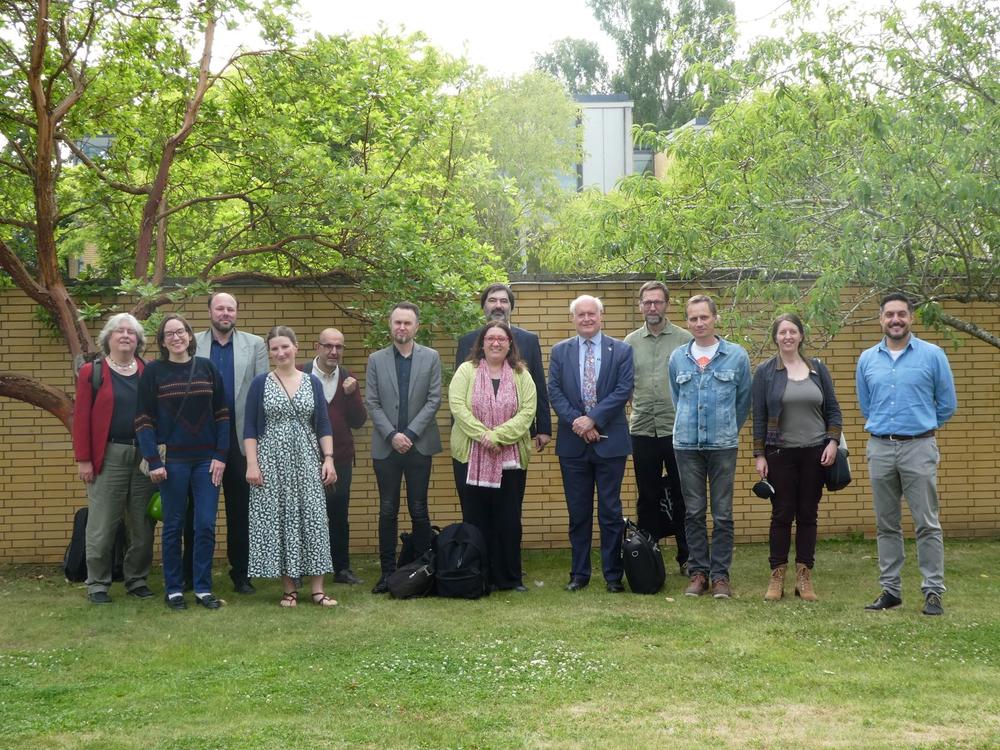International Workshop on ‘Comparative and dialectal approaches to inflectional analogy’
From 23 to 24 June 2022, St Catherine’s College (University of Oxford) hosted an international workshop organized by Xavier Bach (Oxford), Louise Esher (CNRS LLACAN/Oxford) and Sascha Gaglia (Freie Universität Berlin).
News from Jul 29, 2022
The workshop on ‘Comparative and dialectal approaches to inflectional analogy’ was funded by the Oxford Berlin Research Partnership with 7,500 GBP and aimed at bringing together highly acknowledged specialists with interests in inflectional morphology, historical linguistics and dialectology, in order to explore the details of analogical processes through the specific prism of attested dialectal variation and to examine the contributions of this approach. The workshop was attended by speakers based at institutions in the UK, Germany, France, Norway and Australia.
Inflectional analogy, i.e., the workshop’s central issue, is a type of pattern-based language change in which relationships of similarity and contrast between wordforms are transferred into additional clusters of wordforms (e.g. English dive-dove on the model of drive-drove, replacing dive-dived; Blevins & Blevins 2009:6). Because analogy is an essentially relational process in which language users may perceive patterns holding between many tens of grammatical forms for a single lexical word, or many hundreds of individual lexical words, the potential models, routes and outcomes of analogical change are numerous, rendering principled investigation of contributing factors complex. In complement to theoretical approaches which increasingly harness computational power to simulate inflectional systems (e.g. Albright 2009, Parker & Sims 2020), recent work by the organizers (e.g. Gaglia 2020, Esher 2021a,b, Bach 2022) highlights the value of fine-grained analysis of historical documents and of comparative dialect data in providing significant empirical insights into the directionality of analogical change, both in terms of lexical progression (from one word to another) and of paradigmatic progression (from one paradigm cell, tense, person, etc. to another) including arbitrary distributional patterns such as so-called morphomes (e.g. Maiden 2003, 2018); in turn, robustly established directionality provides a firm foundation for developing and investigating hypotheses around the factors which motivate and constrain analogy.
In the pleasant and stimulating environment of St Catherine’s College, the participants had the opportunity to enjoy 12 talks as well as to intensify discussions and to develop new projects as well as collaborations.
For further information, please visit the following website:
Authors: Xavier Bach, Louise Esher, and Sascha Gaglia
References:
Albright, A. 2009. Modeling analogy as probabilistic grammar. In J. P. Blevins & J. Blevins (eds.), Analogy in Grammar. Oxford: Oxford University Press. 185-213.
Bach, X. 2022. Overlapping suppletion and periphrasis: on HAVE, BE, and GO in Gallo-Romance. Word Structure 15(2). 115-137.
Blevins, J. P. & J. Blevins. 2009. Introduction: Analogy in grammar. In J. P. Blevins & J. Blevins (eds.), Analogy in Grammar. Oxford: Oxford University Press. 3-12.
Esher, L. 2021a. La diachronie du prétérit occitan à la lumière des sources textuelles. Linguistica Pragensia 31(2). 115-136.
Esher, L. 2021b. Prospettive comparative e storiche sulla flessione del preterito nelle parlate occitane della Provenza. Vox Romanica 80. 203-238.
Gaglia, S. 2020. The dynamics of analogy: Old French and Old Italian verbal roots. Lingue e Linguaggio 19(1). 61-89.
Maiden, M. 2003. Il verbo italoromanzo: verso una storia autenticamente morfologica. In M. R. Giacomo-Marcellesi & A. Rocchetti (eds.), Il verbo italiano. Studi diacronici, sincronici, contrastivi, didattici. Roma: Bulzoni. 3-21.
Maiden, M. 2018. The Romance Verb. Morphomic Structure and Diachrony. Oxford: Oxford University Press.
Parker, J. & A. D. Sims. 2020. Irregularity, paradigmatic layers, and the complexity of inflection class systems: A study of Russian nouns. In P. Arkadiev & F. Gardani (eds.), The complexities of morphology. Oxford: Oxford University Press. 23-51.

